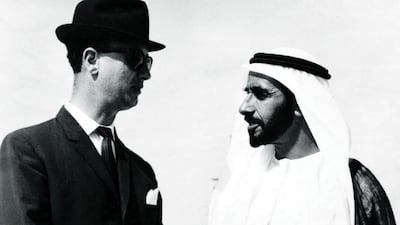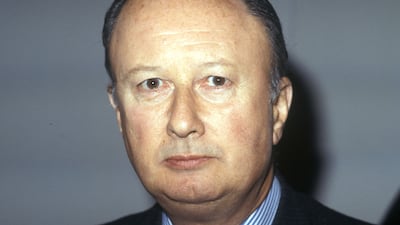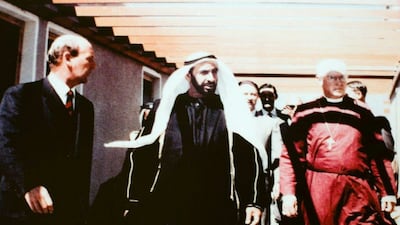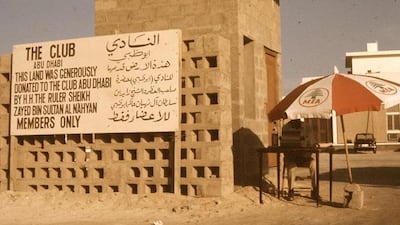Albert “Archie” Lamb, a British diplomat who served in Abu Dhabi during a period of great change, has died a few days before his 100th birthday.
Lamb was Britain's political agent – a role equivalent to an ambassador – in the city in 1965. The emirate was at a crucial juncture – by the time Lamb left, three years later, Sheikh Zayed had become Ruler, Abu Dhabi was transforming and the British had announced that they would leave the Arabian Gulf by 1971.
He, along with his wife Christina, was instrumental in establishing the Abu Dhabi's first British school, which still thrives today as The British School Al Khubairat.
Lamb was also chairman of The Club, Abu Dhabi’s famous private members' institution in Mina Zayed, which opened in 1962. It remains the city's oldest social club.
During the course of his career, Lamb also served in Bahrain and Kuwait, among other places. He died on October 19, four days before his 100th birthday.
Lamb was among the last of the British political agents. By the late 1960s, Britain's imperial era was being swept away and new cities were emerging on the back of oil discoveries. Abu Dhabi was one such city.

Oil had been discovered in the emirate in 1958 and the first shipments left in 1962 but development had been slow.
Lamb's time in the city was punctuated by at least two moments of enormous diplomatic and political significance: first, power transferred from Sheikh Shakhbut, who was Ruler of Abu Dhabi until 1966, to Sheikh Zayed, the UAE's Founding Father.
Then, in January 1968, following the devaluation of sterling, Britain announced its intention to withdraw from the Arabian Gulf. Sheikh Zayed’s nation-building efforts, begun in that period, would ultimately bear fruit in December 1971 with the formation of the Emirates.
There were also more prosaic but no less important challenges facing Lamb upon arrival.
There was no quay in 1960s Abu Dhabi for visiting ships and the living quarters at the political agency were far from family friendly. Lamb and his wife oversaw the refurbishment of the house to bring it up to a habitable standard. The agency became the embassy and it stands today close to Landmark Tower.
The couple played a part in the earliest moments of The British School Al Khubairat, by allowing for a single classroom to be opened in 1965 in the political agency's grounds. This served the handful of English-speaking children in the city at that time, including their daughter, Kathryn, 6.
The classroom later moved down the Corniche into facilities donated by the trading company Gray Mackenzie. In 1968, when the Abu Dhabi Community School was formally established, the classroom moved again, this time to a plot of land donated by Sheikh Zayed. This later became The British School Al Khubairat. From that handful of pupils, the school’s current campus now serves more than 1,900 children.
Abu Dhabi had also begun to blossom in the late 1960s as Sheikh Zayed pressed forward with development plans. By the time Lamb was rotated out of Abu Dhabi, the entire city was growing fast.

When the Lambs hosted a party for expatriates at the end of 1965, the invite list extended to 85 people. By the following year that number had grown to more than 100. A year after that, there were so many in the city that it was impossible to invite everyone.
At the end of Lamb’s time in Abu Dhabi, Sheikh Zayed sent a letter of thanks for his service, saying that he would cherish the memories of his association with the city. The bond between the two was mutual; Lamb once described the Founding Father as “the man who had the wind of heaven always blowing through his bisht [cloak]”.
Lamb’s 2003 memoir A Long Way from Swansea – the title a reference to how his career would take him across the world after humble beginnings – describes how he entered the UK civil service at 17, immediately after leaving school in 1938. He was appointed as a clerical officer for the Foreign Office and his subsequent rise through the diplomatic ranks was once described as inspirational by his peers.
Lamb volunteered for Britain’s Royal Air Force during the Second World War and flew missions during D-Day and the doomed Arnhem operation, earning a Distinguished Flying Cross in the process. Lamb also survived eight days in a lifeboat after the torpedoing of the vessel he was on.
He met his wife just after the outbreak of war in 1939 and the two married in April 1944, shortly before Lamb flew sorties for the D-Day landings.
After the war, he rejoined the Foreign Office. Lamb, who was fluent in Arabic, was posted to Bahrain from 1957 to 1961 and then served for four years at the ministry's so-called oil desk in London, which presided over UK interests in the Gulf and Iran. He then moved to Abu Dhabi.
Lamb also served as British ambassador to Kuwait and Norway before retiring in 1981.
He published four books, including his memoir.
Lamb is survived by his three children. One of whom, Robin, served as British ambassador to Bahrain.








